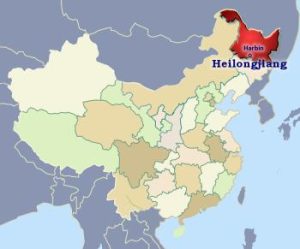HARBIN: Journalists from several international mainstream media outlets visited the Yabuli Forestry Bureau and Weihe Forestry Bureau to explore the new face of forestry transformation and development in China’s Heilongjiang Province.
From the “cold-resistant space capsule” manufacturing workshop to the “forest organic” fresh corn production line, from the smart ecological command center to green planting bases, foreign media recorded through cameras and words the innovative practices of Longjiang Forestry Industry in ecological protection and green industry development.
In the production workshop of Yabuli Jingzhe RV Co., Ltd., the bustling assembly of cold-resistant space capsules drew the attention of the journalists. Dozens of box-style houses were neatly arranged, their wooden exterior panels appearing somewhat thin.
“Can these houses really withstand living conditions in temperatures dozens of degrees below zero?” one foreign journalist asked on-site. Liu Honglin, deputy general manager of Jingzhe RV Co., Ltd., explained that the box-style houses are built using cold-storage-grade polyurethane insulation materials. Last winter, indoor temperatures remained around 25°C, making them suitable for living as well as for use in forest management, fire prevention, tourist attractions, and large construction sites.
Compared with traditional reinforced concrete structures, these houses require no foundations, cause no damage to forest vegetation, and can be moved freely. They can be combined into any size, based on 18-square-meter units. “In the past four years, our annual sales have been about 10 million yuan, with a monthly output of up to 30 units,” said Liu.
Leaving the workshop, the journalists followed the fresh scent of grains to a fresh corn processing line. Amid the roaring of machines, corn rapidly flowed along conveyor belts. Reporters observed production process. Leveraging the ecological advantages of forest areas and Yabuli Bureau’s 170,000 mu of certified farmland, forest organic fresh corn achieves a processing speed of just three hours from harvest to storage, locking in maximum freshness.
“This industrial chain can be traced from the very source—farmer contracts, soil testing and fertilization, household planting schedules—all the way through to production and sales, covering land, factories, and markets,” said Chen Sihao, head of Sengeng Agricultural Group, in an interview. The processing plant is expected to generate an annual output value of 200 million yuan, benefiting 300 farming households, with each mu of fresh corn increasing farmers’ income by about 1,000 yuan.
At the Weihe Ecological Comprehensive Command Center, the media group gained in-depth understanding of this 8,600-square-meter modern facility, which integrates forest fire prevention and control, flood emergency response, and resource management. Equipped with GIS geographic information systems, drone monitoring, and other advanced technologies, the center provides real-time dynamic supervision of 198,678 hectares of forest resources.
“We fully implement a ‘human-land-sky integrated’ forest management model,” said Chen Liang, head of the Forest Resources Department of the Weihe Ecological Command Center. “By combining professional forest rangers with intelligent drones, we achieve round-the-clock patrols of forests, farmland, and rivers within designated responsibility zones.”
Currently, a professional management team of 198 people has been formed, and cooperation agreements have been signed with ecological farmers raising forest frogs, bees, and other species, creating a joint system of forest resource protection.
“We also strictly enforce a 24-hour reporting and response mechanism, ensuring that any abnormal situation is immediately reported, escalated, and dealt with according to regulations, effectively safeguarding national forest resources and regional ecological stability,” Chen added.
Afterward, the foreign media delegation visited the Weihe fruit and vegetable planting base, which has revitalized idle assets to build a modern ecological agriculture demonstration zone. The base currently operates 106 greenhouses, including over 30 for vegetables, 60 for grapes, as well as specialized areas for melons, strawberries, and wild vegetables such as aralia sprouts and dandelions.
Song Chunlei, deputy general manager of the Forest Food Branch of Weihe Forestry Bureau Co., Ltd., explained that the base strictly adheres to green planting standards, completely avoiding chemical fertilizers and pesticides. Through an ecological recycling model, product quality is kept natural.
In addition, the supporting ecological park integrates children’s play facilities and animal viewing, becoming a new leisure and entertainment landmark for local residents. This has realized a dual win of ecological and economic benefits. The visiting media delegation praised Weihe Forestry Bureau’s green planting model and intelligent management system, saying it provides a replicable Longjiang solution for global ecological protection. –Agencies
Home CHINA-CPEC-BRI Foreign media explores forest preservation, ecotourism, industrial development in Heilongjiang






